
by Mark Yon
Scenes from England
Hello again!
As the weather changes to Springtime, things seem to be gathering a-pace here. So, I’ll get straight to it.
First up: Science Fantasy.

Another ‘arty’ cover – though to me, being uninitiated in such matters, the photo that makes up the cover just looks out of focus. The artist is (perhaps justifiably) unknown.
The Editorial this month takes on the issue of reader’s opinions made through letters to the Editor. The Editor comments on how both gratifying and depressing it is to read the letters, those that say how good the newly reinvigorated magazine is and those that ask why the magazine is not like ‘the old days’. He then launches into the now-familiar refrain that the magazine and the genre itself has to adapt and change to survive.
Which it seems to be doing very well at the moment.
Despite his protestations that he enjoys reading them, it seems that the Editor has agreed to give a Letters Column a try. Suspect that’ll be a job passed down to the (relatively-new) Associate Editor, then!
To the stories themselves.
A Man in His Time, by Brian Aldiss
Another month, another big name. Last month it was the usually wonderful Harry Harrison, this month it is Harry’s friend and often co-collaborator, Brian Aldiss.
A Man in his Time is a time travel story, of sorts. Despite this being a hoary old cliché, Brian uses his formidable skill to write a story that takes the cliché and turns it into something new. Jack Westermark is the only survivor of an expedition to Mars but has been mysteriously found on Earth with no memory of how he got there. Over the course of the story it appears that he is living 3.3077 minutes ahead of present Earth time, an event which has considerable effect on himself and his wife and family. There’s a lot of disjointed, fractured sections to reflect Westermark’s state of mind, and put forward the idea of a non-linear temporal existence – that Jack may be living both in the present and the future at the same time, something that may be due to different planets having their own time field. By travelling to Mars it may be that he has crossed over, so to speak, into a later time, but has returned to Earth at its earlier time.
A Man in his Time is pleasingly mature in nature and the sort of thoughtful and literate story that shows the more serious side of Aldiss’s writing. The story focusses on the various consequences of the temporal event by concentrating on the psychological effects on Westermark and his family – the dislocation between Westermark and his wife and also his mother, the effect on the children and even suggests that the situation may be leading to Jack having a mental breakdown, which gives it that New Wave kudos and a story firmly placed in its time. Less 1940’s sense of wonder, more 1960’s inner musing, to bring an old cliché (dare I say it?) bang up to date. Another strong start to an issue. 4 out of 5.
The War at Foxhanger, by Keith Roberts
To lighter material now. This is another Anita story, which is an ongoing series. This time teenage witch Anita and her annoying Granny are involved in an ongoing feud with the newest member of their sisterhood, who lives at the titular Foxhanger Farm. In this story things quickly escalate and become more of a personal attack, so much so that at one point the frantic battle makes the story read like a demented version of Mickey Mouse’s The Sorcerer’s Apprentice in Fantasia.
Although Anita is involved, this tale focuses on Granny, so expect lots of writing in a strangled dialect. Nevertheless, this is up to par with previous stories and will therefore be equally loved by some readers and create annoyance in others. 3 out of 5.
The Chicken Switch, by Elleston Trevor
A story of the Space Race, set in what is presumably the near future. Scientists and astronauts are preparing for Mankind’s exploration of the Moon. The story deals with the stresses and strains on those involved, with ‘the chicken switch’ (the button pressed to bail out on the deal) always being an option. Unsurprisingly, there’s lots of angst and drama, which read easily enough.
Mr. Trevor is a seasoned writer – you may know him for his novel The Flight of the Phoenix published last year – though not an author usually known for sf, and it shows in this well written story. At times it did feel a little like something out of a soap opera, but it can’t be denied that the twist at the end was a good one. 3 out of 5.
Susan, by Alastair Bevan
Another story by Keith Roberts under his pseudonym.
Susan is a schoolgirl who is more than she seems to be in this strange little tale. It works, but reminded me too much of the first episode of Doctor Who in its telling of the effect Susan has on things at school and what happens to her on her way home. Well written but not particularly original. 3 out of 5.
The Excursion, by B. N. Ball
This is about what happens on a day excursion as part of a holiday tour to Old Sol and its planets. Its simplistic caricatures of personalities (pompous military man, stuffy academic, young woman as an ex-escort, old woman more concerned with finishing her knitting than the visit) make this at first feel like it is going to be one of those lighter efforts, but it does turn darker when the tourists inadvertently find themselves incarcerated and put on trial by an automatic defence system as suspicious aliens on restricted territory. The two styles don’t mix very well and even if this implausibility wasn’t enough, there’s even an unfortunate racial aspect, with talk of ‘Orientals’, ‘Asiatics’ and ‘Neo-Negroids’. It left me thinking that this is this issue’s weakest offering; an unbelievable adventure story of the type I thought we’d left behind. 2 out of 5.
Over and Out, by George Hay
And covering similar ground, Over and Out is a short one-idea story told through telex messages sent by someone who has been locked into their home by the computers whilst they rewrite history. It was difficult to take seriously after the story before it, but it is very short.
Like the computer’s attempt to change history, its point is quickly forgotten. 2 out of 5.
Hunt a Wild Dream (part 2), by D. R. Heywood
This story started well last month but then bizarrely stopped dead just as it was getting going. This one starts exactly where we left off – no preamble, no explanation. Hunter Cullen continues his expedition into the African savanna searching for the something rather odd. He finds it, and a strange connection between Cullen and the creature is revealed. I did say last month that this story could develop into an interesting and scary story or fizzle to nothing. Sadly, this one fizzled. Not sure why it was split but it wasn’t worth the effort. A bit of a damp squib to finish the issue. 2 out of 5 this month.
Summing up Science Fantasy
After last month’s Science Fantasy was nothing too special, this month’s was slightly better. It’s not perfect, but it generally was a good read, with some noticeable disappointments. The Aldiss is a stand-out. As Kyril said in his Editorial, “Look – we have survived where others have failed – and we are still improving.” I can’t disagree with that.
The Second Issue At Hand

This month’s New Worlds features the return of a veteran: stalwart E. C. Tubb, whose name is displayed with enthusiasm on the cover. Whilst we’re still on the circles theme for the cover, it can’t be denied that it is eye-catching.
The Editorial is a short one, extolling the merits of Anthony Boucher’s The Magazine of Fantasy and Science Fiction, presumably for those who find it hard to get copies over here. It then repeats the message already given in Science Fantasy that things are changing, then asks whether New Worlds should accept science-fictional material of a substandard quality but which is obviously science fiction or whether it would be happy to accept material less obviously science-fictional but outstanding.
Personally, I think that’s a tough call. There is a risk that by broadening its remit the magazine may lose its identity, although at the same time it might just pick up newer readers who wouldn’t have previously considered looking at the magazine. But it is, nevertheless, a gamble.
The Life Buyer (part 1 of 3), by E.C. Tubb

[Art by aTom]
So, here’s the first part of a three-part serial from a long-time SF writer who is one of ‘the old guard’, but one Moorcock has said before is one of his favourites, and is here, according to the banner, “By popular request”.
The setup is intriguing. Marcus King is a billionaire with unlimited wealth in a future world where, for the right price, most things seem possible. An assassination attempt leads detectives Markham and Delmonte to try and discover whodunnit, which becomes more complicated the more is revealed. The twist is that the pilot of the plane that flew into King’s building was wearing one of King’s products – a krown, which when fitted to your head can adapt mental and physical reactions. It has replaced drugs, anaesthetics and provides restful sleep if the wearer wishes it.
This then raises questions: Who is to blame? Why are they trying to kill King? And why is King haunted by dreams of death and decay. What do they mean and why is he getting them?
A well-written story, it shows how much things are changing in SF. This is a detective story, which is not that unusual in SF, but it is also a psychological story – the dream state and the ability to manipulate the brain makes this a tale of inner space, if you like. The pacing is great, the setup is clever, and the cliff-hanger ending left me intrigued enough to want to read more. And one of the lead characters is named ‘Marcus’ – I’m sure my fellow traveller will be pleased! A great story and a good start to the issue. 4 out of 5.
The Changing Shape of Charlie Snuff, by R. L. Mackelworth
Another odd one by Mackelworth. It’s the story of a shape-changing alien currently in human form and his connection with a young girl and an atomic scientist. The key aspect is that his shape changes depending upon the need of the person he is with – the greater the need, the more likely it is to change to what they want. A nice idea but limited in its development. It’s quite dark and deliciously cynical. 3 out of 5.
In One Sad Day, by George Collyn
This is also a story about odd creatures by another returning author. It’s a sombre piece about what seems to be an alien on a strange world whose communication with another being leads to a revelation at the end. I didn’t see the twist coming, but it is a bit of a cliché once revealed. 2 out of 5.
Death of an Earthman, by Gordon Walters
It’s good to see some fiction from this author, otherwise known as George Locke, and last seen in the January 1965 issue of New Worlds writing a non-fiction article about Space Drives.
Death of an Earthman is another detective story with a science-fictional setting. The lead character this time is a police detective who works on empathy, an issue that comes to the fore when there is a murder onboard The Seas of Deimos, the spaceship that he is travelling on. What makes the story interesting is that the key suspect is an ex-Captain of the spaceship – a man who, when he lost his captainship, also lost his arms. This is an issue as the victim appears to have been strangled! A great setup that works well, except at the end where it all falls apart in some kind of awful Flash Gordon type melodrama. As a result, this one scores between 2 and 3 out of 5, but I’m going to suggest 3 out of 5 in the end.
Third Party, by Dan Morgan
Morgan is a new name to me. This short story deals with the future of marital relationships. Harry Pierce has had an affair and as a result he and his wife Madge have had a month-long Trial Separation Period, the consequences of which are to be decided by the Marriage Integration Department. Things all get a bit Kafka-esque. Although definitely chilling, it does seem a little far-fetched. 3 out of 5.

What Next?, by Edward Mackin
And here’s a Mackin novella that many readers of the old New Worlds and Science Fantasy will appreciate, as it involves fan-favourite character, the cyberneticist Hek Belov (last seen in Science Fantasy in October 1963.) This time around, Hek is employed by Jonas Pinquil, an eccentric with lots of money and seemingly not too much of a grasp on reality. When asked to help setting up a matter transmitter with an old adversary, Meerschraft, Hek finds himself involved in a scam that goes awry. It’s a jaunty little novella that was great fun to read and not to be taken seriously at all, towards the end turning into some sort of science-fictional screwball comedy. I like Hek as a character, who for some reason makes me think of a grumpier version of Asimov’s detective, Wendell Urth. 3 out of 5.
The Flowers of the Valley, by Keith Roberts
We just can’t get away from the prolific Keith Roberts, can we? As if it wasn’t enough with him taking up almost permanent residency over at Science Fantasy, here he is in New Worlds with a strange tale about how Nature will be manufactured in the future, and at the same time deals with a fractured relationship between the botanist narrator and his partner Priscill. It’s odd, but remained with me after I finished reading it, so 3 out of 5.
Reactionary, by P. F. Woods
And lastly a story by Barrington J Bailey under his nom-de-plume.
Reactionary is about a dinner-table gathering who are drawn together to witness something seemingly impossible – something that proves that Newton’s third law of motion is wrong. It’s a slight little tale, but the last paragraph has a good little twist. 2 out of 5.
Articles and Books
There are no Articles this month, which is interesting considering the push they have been given in the last few issues. (Surely the feedback can’t have been that bad already?)
In terms of Books this month, Assistant Editor Langdon Jones points out what I suggested earlier – that Sf is changing. To illustrate this, he reviews Arthur Sellings’s The Silent Speakers and The Sundered Worlds by New Worlds’s own Editor, Michael Moorcock.
Sellings’s story is a ‘fascinating’ tale of a meeting of minds, whilst Moorcock’s is typical of ‘the outward-directed story’, all galaxies and space opera. It is full of ideas, but Langdon Jones dares to criticise the writer/editor by saying that the ideas get in the way of the story. Lastly, Richard Matheson’s A Stir of Echoes is a welcome reissue.
The Letters Pages are surprisingly brief this month – there is one (admittedly quite lengthy) letter! It is one of praise, discussing the value of magazines in the past of bringing SF to people’s attention and then pointing out New Worlds’ importance as a result. Again, it is a nice summary of where we’ve been and how things are changing.

Ratings this month for issue 147 (that’s the February 1965 issue). We have another tie, this time between John Baxter’s More Than A Man and John Hamilton’s When The Skies Fall. The winner, Arthur Sellings’ second part of The Power of Y isn’t a surprise, though.
Summing up New Worlds
Another strong issue. Particular favourites were The Life Buyer and Death of an Earthman (until the last part), although One Sad Day was a cliched low point.
Summing up overall
Another good issue for Science Fantasy, but New Worlds is again the winner this month.
And that’s it for this time. Until the next… which will include the 150th issue of New Worlds!




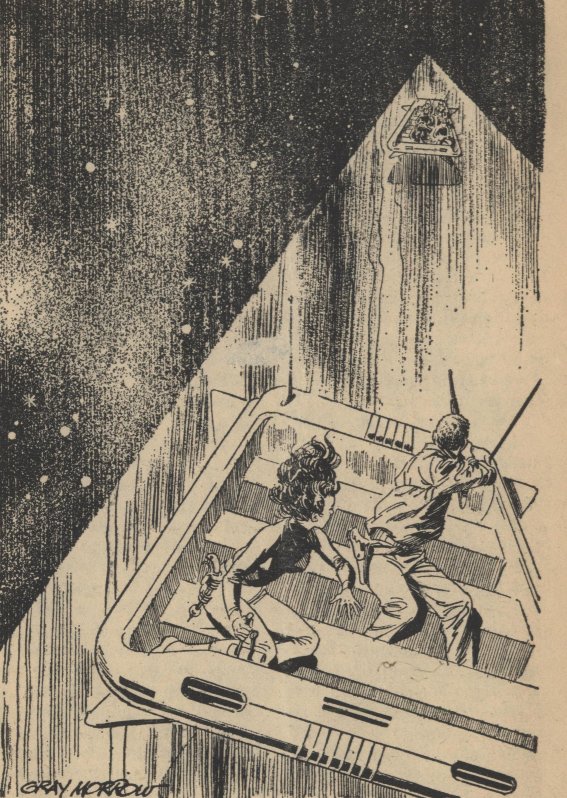
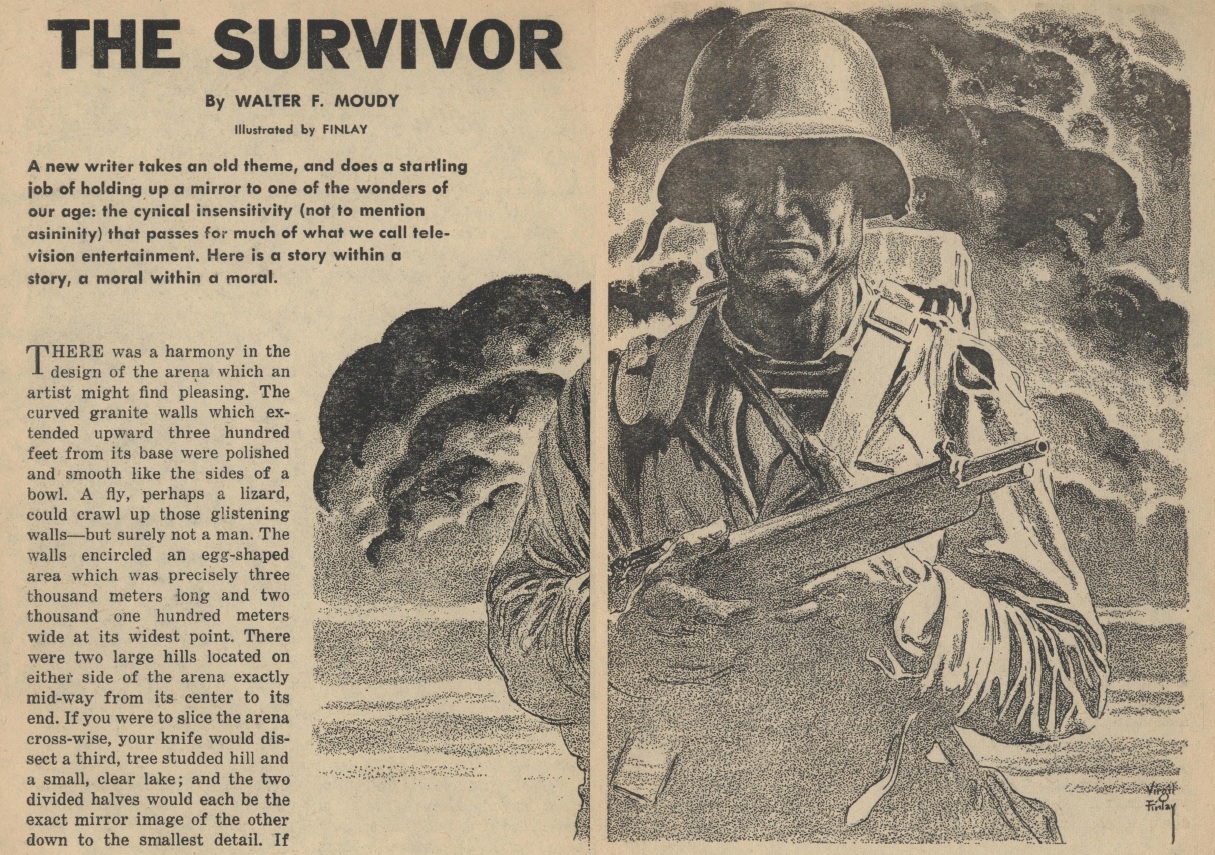



![[April 12, 1965] Not Long Before the End (May 1965 <i>Amazing</i>)](https://galacticjourney.org/wp-content/uploads/2020/04/650412cover-672x372.jpg)

![[April 2, 1965] SPEAKING A COMMON LANGUAGE (May 1965 <i>IF</i>)](https://galacticjourney.org/wp-content/uploads/2020/03/IF-April-cover-647x372.jpg)



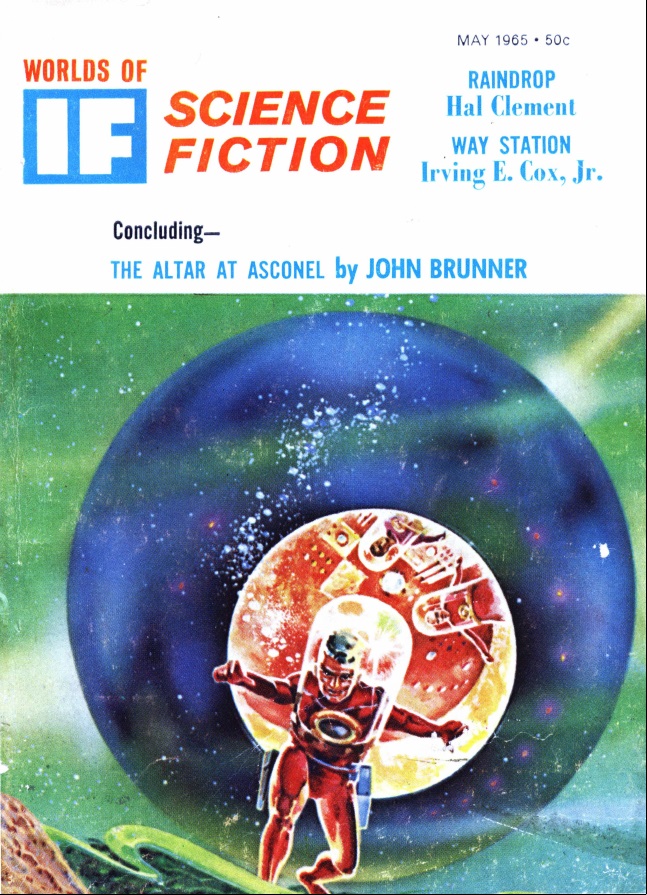
![[March 30, 1965] Suborbital Shots (April 1965 <i>Analog</i>)](https://galacticjourney.org/wp-content/uploads/2020/03/650330cover-598x372.jpg)

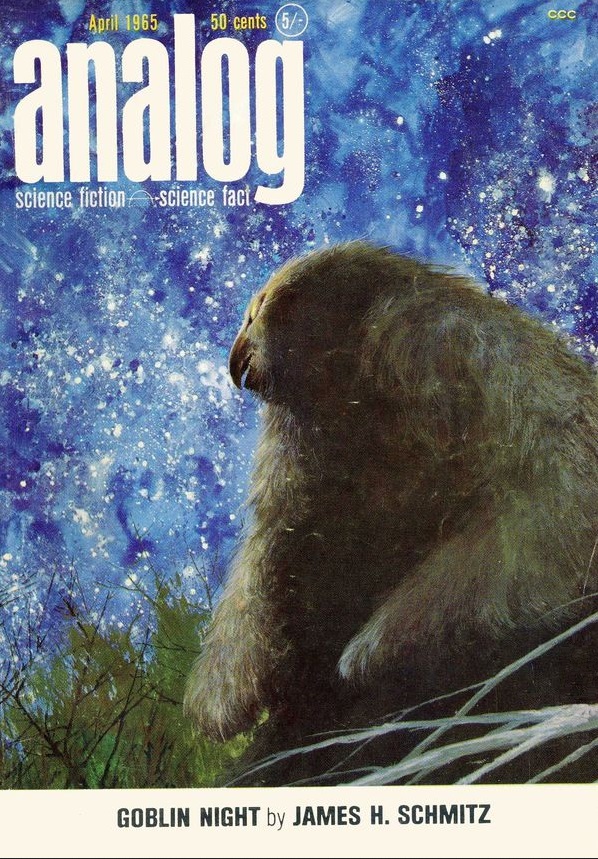


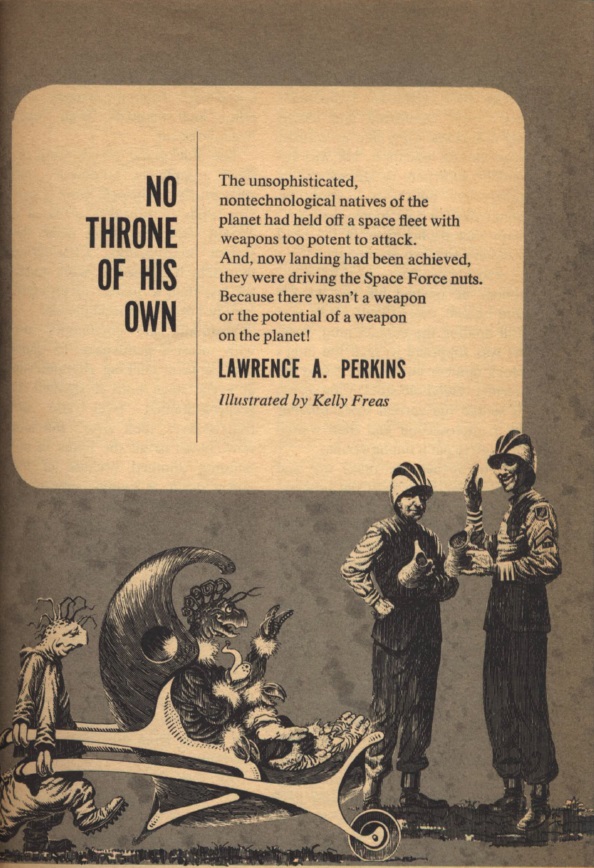
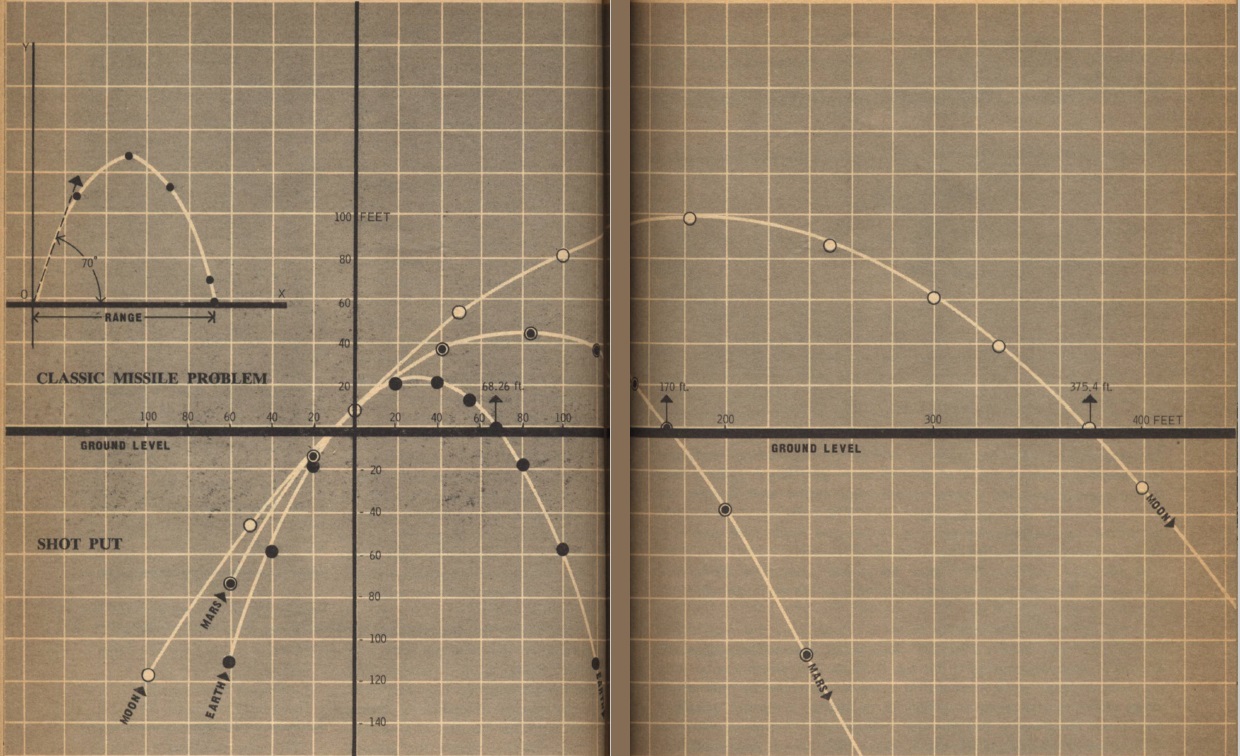


![[March 28, 1965] Detectives, Curses and Time Travel <i>New Worlds and Science Fantasy, March/April 1965</i>](https://galacticjourney.org/wp-content/uploads/2020/03/SCF-April-1965-1-461x372.jpg)






![[March 26, 1965] Digging Up the Past (April 1965 <i>Fantastic</i>)](https://galacticjourney.org/wp-content/uploads/2020/03/Fantastic_v14n04_1965-04_0000-2-672x372.jpg)








![[March 20, 1965] Clash of The Old & The New (February 1965 <i>Gamma</i> & <i>City of a Thousand Suns</i>)](https://galacticjourney.org/wp-content/uploads/2020/03/650320covers-672x372.jpg)











![[Mar. 18, 1965] Per Aspera (April 1965 <i>Fantasy and Science Fiction</i>](https://galacticjourney.org/wp-content/uploads/2020/03/650318cover-672x372.jpg)





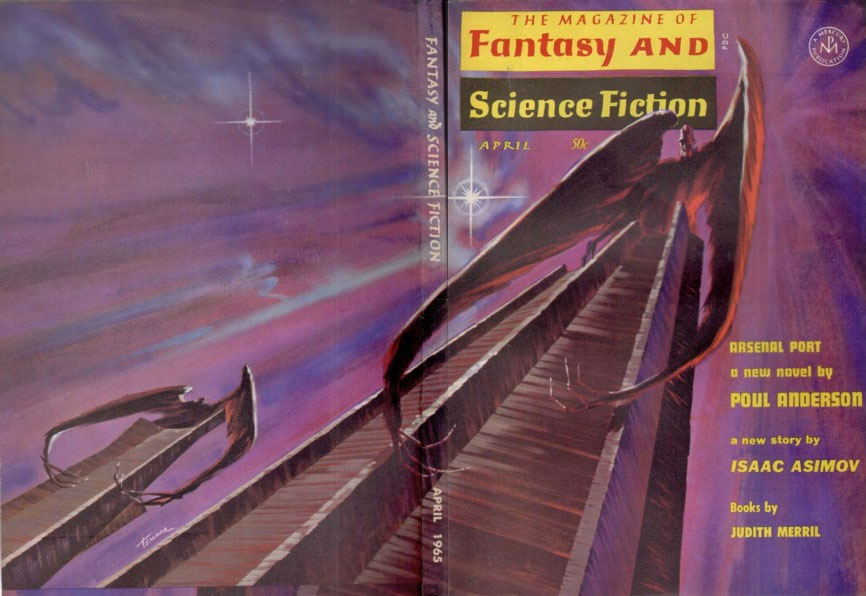
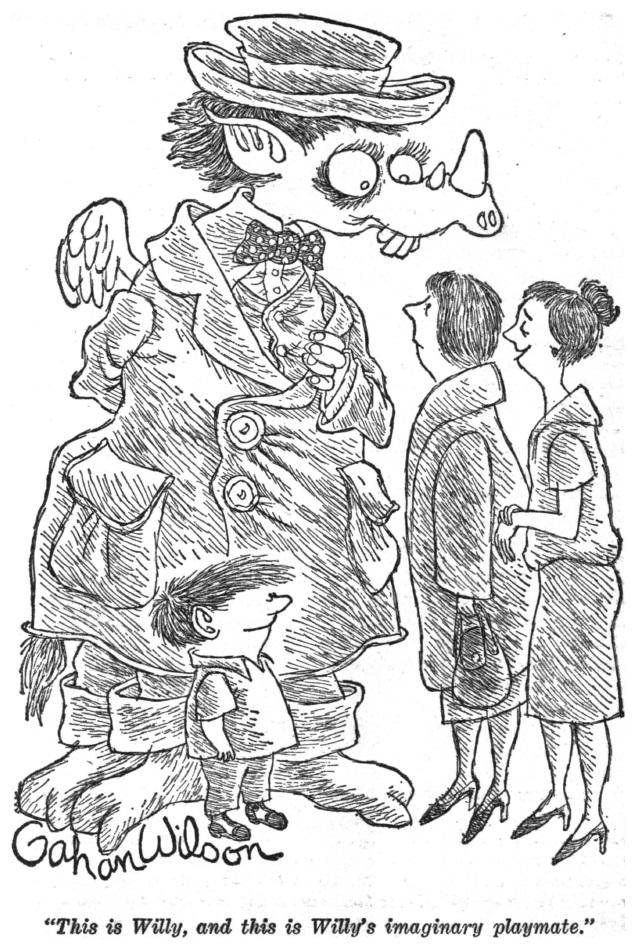
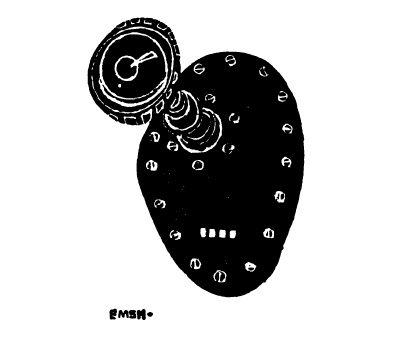

![[March 16, 1965] Browsing the Stacks (May 1965 <i>Worlds of Tomorrow</i>)](https://galacticjourney.org/wp-content/uploads/2020/03/Worlds_of_Tomorrow_v03n01_1965-05_0000-2-672x316.jpg)













![[March 12, 1965] Sic Transit (April 1965 <i>Amazing</i>)](https://galacticjourney.org/wp-content/uploads/2020/03/amz-0465-cover-672x372.png)



![[March 8, 1965] An Alien Perspective (April 1965 <i>Galaxy</i>)](https://galacticjourney.org/wp-content/uploads/2020/03/650308cover-435x372.jpg)







